|
The
history of the von Loë family begins with its first
mention in a document dating as far back as the 12th
century as Crampe von Sykenbecke hailing from the Westphalian
town of Marl (the horseshoe-shaped Crampe hoop is depicted
on the family coat of arms).
As owners of the local Loe Castle with today's remnants
of the Loe mill, the family decided in the 13th century
to adopt von Loë as its name and in 1461 established
the roots of its ancestral seat in Wissen Castle near
Weeze on the Lower Rhine.
In 1629, the family advanced to Baronial status by order
of the Emperor. From Wissen Castle, the von Loë
family branched out in various directions owning a number
of estates on the Lower Rhine.
From the life experience of the family and its descendants
as well as large parts of its kinsfolk developed a special
character of care and concern for the common weal, the
Catholic and Protestant churches, the military and administrative
services, and the job outline of agricultural and forestry
workers in responsible positions on their family estates.
For many generations now, we have given particular attention
to the responsible enjoyment and active stewardship
of nature.
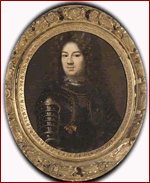 |
Jan
Adolph Baron von Loë 1707
Canon in Hildesheim
after an oil portrait in the Wolfskuhlen Archives
|
Felix
Baron von Loë 1882
Founder of the Rhenish Farmers' Union (predecessor
of today's Agricultural Association)
after an oil portrait in the Wolfskuhlen Archives
|
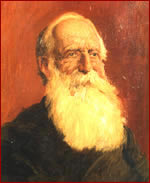 |
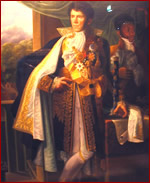
|
The
"Wolfskuhlen" estate came to the
von Loë family from a direct line of relatives
in the families due Monceau (Jan-Baptiste Comte
Due Monceau, General in Napoleon's army) and... |
...Baron
von Büllingen-Wevelinghofen
(Honorary Mayor of Budberg).
|
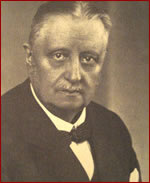 |
 |
As heiress
to Carl Baron von Büllingen-Wevelinghofen and
his Belgian wife Eugenie Comtes Du Monceau, their
daughter Emilie, married to Rudolf Baron von Loë
from the Wissen line of "Terporten", continued
to manage the Wolfskuhlen estate.
In the confusion of the "Third Reich",
she served the Catholic church by giving refuge
to various clergy persecuted by the regime at her
ancestral seat. |
"Wolfskuhlen
Castle"
opposite the integrated ...
|
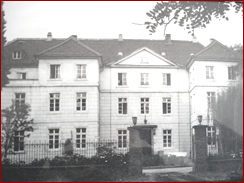 |
|
|
|
|